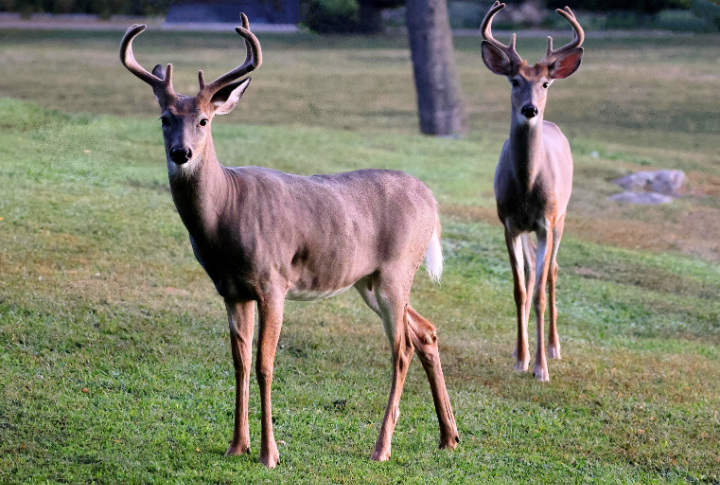
White-tailed deer populations vary dramatically across the United States, with some states hosting over a million of these adaptable creatures. Each state’s unique ecosystem and management practices shape its deer numbers. Be it Texas’s vast herds or Wisconsin’s trophy bucks. As of 2024, let’s look at these top 15 states where white-tailed deer thrive in numbers!
Texas

This state leads the pack with 4.5-5.5 million white-tailed deer! The vast scenery from Hill Country to East Texas forests provides optimal habitats. Texas’s large size and varied ecosystems contribute to its impressive deer community, making it a prime location for wildlife enthusiasts and hunters.
Michigan

Home to approximately 1.5-2 million white-tailed deer, Michigan’s abundant forests, wetlands, and agricultural areas offer excellent food sources and cover. Deer management practices like regulated hunting seasons help the state maintain a healthy population across the Lower and Upper Peninsulas.
Alabama

Deer populations thrive here because of its mild climate and various habitats like the coastal plains. Due in part to the state’s extended growing season, which guarantees plenty of vegetation, Alabama has a sizeable annual deer population. Approximately 1.5 to 1.8 million white-tailed deer reside here!
Mississippi

The number of white-tailed deer in Mississippi equals 1.5 to 1.8 million. This animal finds a well-suited environment in the state’s combination of river bottom habitats, agricultural fields, and hardwood woods. Mississippi’s continually high deer population results from its good climate and effective deer management.
Wisconsin

Wisconsin is well-known for its trophy bucks; northern forests and agricultural areas make it an ideal deer habitat. The state’s emphasis on conservation and deer management preserves its healthy populace. About 1.3 to 1.6 million white-tailed deer call this place home.
Missouri

Missouri hosts about 1.2 to 1.5 million white-tailed deer. The state’s diversified geography, which includes the Ozarks and river bottomlands, provides diverse habitats. A strong and steady deer population may be found thanks to conservation initiatives and controlled hunting methods.
Pennsylvania

Pennsylvania’s blend of farmlands, mountains, and hardwood woods provides an excellent environment for deer. Its long history of hunting traditions and wildlife management preserves Pennsylvania’s substantial deer population. All in all, it provides a home for about 1.5 million white-tailed deer.
Georgia

Georgia’s huge deer population can be attributed to its effective wildlife management strategies and suitable environment. 1.2 to 1.3 million deer roam here, with the state’s Piedmont region hosting the highest deer densities. Georgia’s topography, comprising the Appalachian Mountains, supports differentiated deer populations.
New York

Despite its reputation as an urban state, New York has a sizable deer population in its extensive rural and woodland regions. Programs for managing such animals help balance population control and conservation. Surprisingly, it hosts around 800,000 to 1.2 million white-tailed deer.
Minnesota

Minnesota’s deer contribute to a $1.3 billion annual hunting economy, with a population of 800,000-1.2 million white-tailed deer. The state’s deciduous forests and prairies serve varied habitats. Minnesota partly maintains healthy deer inhabitants due to its management tactics, including strictly controlled hunting seasons.
North Carolina

The controlled hunting methods and wildlife management initiatives implemented in North Carolina contribute to preserving a healthy deer population. Although it does not host more than 1.3 million deer, North Carolina’s Coastal Plain records among the highest deer densities. It allows urban archery seasons to manage suburban deer populations.
Kentucky

This is where approximately 800,000-1.1 million white-tailed deer live. Kentucky’s Bluegrass region is famous for its high-quality deer habitat. The state’s mix of forests and agricultural land creates a perfect deer ecosystem. It has one of the highest proportions of trophy-class bucks in the nation.
Tennessee

The state’s deer density varies greatly, from 15 to 89 per square mile across regions. Around 900,000 deer call this state home. Tennessee’s elk restoration program has created unique management challenges for deer. The Appalachian and Mississippi floodplains also provide diverse habitats.
Virginia

Long-standing wildlife management techniques in Virginia contribute to a balance between deer numbers and resource availability. With 700,000-1 million deer living here, Virginia’s early muzzleloader season attracts specialized hunters. This state was also among the first to implement quality deer management practices.
Indiana

Indiana’s environment sustains a variety of deer habitats, between 600,000 and 1 million deer. Antlerless deer harvest is encouraged by the state’s unique “Earn-a-Buck” program in urban areas. Every year, deer hunting in Indiana brings in over $200 million for the state’s economy.

